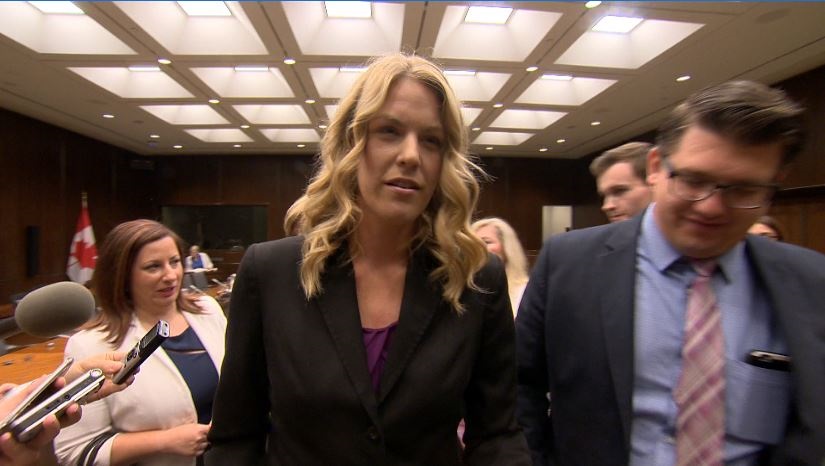To hear Liberals boast about the procedural hanky-panky they engaged over the last two weeks at a parliamentary committee, one would believe they struck a blow for women, advanced abortion access rights, and beat back a dangerous political foe who threatened to undo decades of work on gender equality.

In fact, the Liberals on that parliamentary committee — and their party’s leaders — should be ashamed of their contemptuous abuse of Parliament’s rules and traditions, of their hypocrisy in failing to take any meaningful action to advance abortion access rights, and, on top of all of that, for forcing a woman to take on a job she did not want.
The committee at hand is the House of Commons Standing Committee on the Status of Women, one of 27 standing committees of the House of Commons.
The Liberals, as the governing party, get to have one of their MPs as the chair of all of but four of those committees. The committee on the status of women — or FEWO (pronounced fee-woe) to use the four-character designation given it by the Library of Parliament — is one of the four committees where, by rule, the chair must be a member of the Official Opposition. (You can read the rule yourself: It’s Standing Order 106(2)).
The Standing Orders also require that all the members of each committee get to vote for the Chair of their committee. Now, normally, this is a mere formality. Each party’s leadership decides which MPs get to be committee chairs. It’s a posting that comes with an extra $17,000 a year in pay and is seen as a way for party leaders to groom future cabinet ministers or reward political allies.
Every standing committee, including FEWO, has 10 members. Committee seats are allocated to mirror the party standings in the House of Commons. So in this Parliament, every committee, including FEWO, has six Liberal MPs, three Conservative MPs and one New Democrat.
So on FEWO and the three other standing committees where the chair must be a member of the Official Opposition, the Liberal majority cannot vote to install anyone but a Conservative.
That had never been a problem until last week at FEWO.
READ MORE: Liberals accused of ‘thwarting democracy’ after walking out of women’s committee vote
The Conservative leader Andrew Scheer decided that Rachael Harder, an MP from Lethbridge, Alberta who just turned 31 on Tuesday, should be the chair of the committee.
Malcolmson has just one vote on the committee. To block Harder’s nomination, she would have to whip up Liberal opposition and the Liberals on the committee, led by Burlington, Ont. MP Pam Damoff, were only too happy to oblige.
WATCH: Liberal MP Pam Damoff says Conservative MP unfit to speak for women

Now Harder did not actually cast a vote on transgender rights in the House of Commons, as my colleague Amy Minsky reported, but she did co-sponsor a private member’s bill which would have made it a criminal offence to kill or injure “a pre-born child”, a bill some critics saw as an attempt to chip away at the rights of a pregnant woman. (The bill was defeated by vote in the House of Commons).
So, mindful of the rule that a Conservative must be the chair of the committee but needing to make sure Harder would not be that Conservative, the Liberals on FEWO nominated Harder’s caucus colleague, Karen Vecchio. Vecchio objected. She didn’t want the job. She wanted Harder to be chair. Too bad. Liberals and NDP MPs on the Status of Women committee were going to force a woman — Vecchio — to do a job she did not want to do.
Vecchio and Harder issued a joint statement after this vote: “Conservatives accept the democratic will of the committee and, unlike Justin Trudeau, we commit to working on behalf of all women in Canada, regardless of their beliefs.”
Damoff declared this tricky and, so far as I know, unprecedented procedural sleight-of-hand as “a victory for Canadian women.”
But how could that possibly be a victory? Nothing was gained for “Canadian women.” No new rights were established. No glass ceilings were smashed. If anything, one Canadian woman — Rachael Harder — was told she was unsuitable for a job because of the views she held.
Would Harder’s appointment have somehow threatened or changed abortion access rights in Canada? Not in the least. In fact, as a chair of a committee, Harder would have been, by and large, taking herself out of the activist game, as committee chairs generally do not engage in debate at committee meetings. (Journalist Dale Smith also has correctly recognized that, in picking Harder to be the chair of FEWO, Scheer was likely to make Harder a less effective official critic for the Status of Women.)
In any event, no standing committee, including FEWO, has any power to introduce regulations or write up new legislation. Any new legislated restrictions to abortion access rights would have to be approved by the House of Commons, an unlikely event given the current majority held by the Liberals or given the fact that, according to the Abortion Rights Coalition of Canada, 70 per cent of the 338 MPs in the House are pro-choice. A regulatory change to somehow curtail abortion services would need the approval of the federal cabinet.
Even still: if there were ever a bill outlawing or restricting abortion access rights, it almost certainly would not be referred to the Status of Women committee. No, any such legislation would likely be a matter for the Standing Committee on Justice and Human Rights or possibly the Standing Committing on Health.
Both those committees also have a Liberal majority and both those committees are chaired by Liberals.
Speaking of which . . .
The health committee is chaired by Bill Casey, who first came to Parliament as a Progressive Conservative, then deserted Stephen Harper’s Conservatives to sit as an independent, before becoming a Liberal in time to run for Trudeau in 2015.
Trudeau insisted that all new candidates, like Casey, would have to be pro-choice and Casey declared himself as such.
And, yet in 1989, Casey stood in the House of Commons and declared himself against abortion and against choice. ” I believe that life begins at conception,” Casey said. “To me, all unborn children are unique individuals . . . and all unborn should be protected only unless the life or the health of the mother is at stake.”
And if a private member’s bill were to make it onto the floor of the House of Commons that sought to somehow tighten abortion access rights, that bill would have to get by Filomena Tassi, a Liberal MP from Hamilton, Ont. Tassi is the chair of the four-person subcommittee on private members’ bills which reviews any such bill before they go to the House.
Before Tassi was elected in 2015, she was a chaplain at a Catholic high school and has declared herself pro-life. Though she told reporters ahead of the 2015 election that she supported and understood Trudeau’s edict that all his candidates must be pro-choice, she would not say how she might vote if a bill restricting abortions were ever to come before Parliament.
Two other Liberal MPs who chair or chaired standing committees in this Parliament, John McKay and Boris Wrzesnewskyj, were, like Tassi, tagged by the Abortion Rights Coalition of Canada as being anti-choice. McKay currently chairs the public safety and national security committee. Wrzesnewskyj was the chair of the citizenship and immigration committee.
Any of those committees — health, public safety, immigration and even the subcommittee on private members’ bills — could arguably be seen to have a much more direct impact on the health and welfare of Canadian women than FEWO.
In any event, the “victory for Canadian women” that was the vanquishing of Harder is, like Trudeau’s decree that all his candidates must be pro-choice, more about virtue-signalling than it is about actually getting something done for Canadian women. Indeed, to the extent that you think more ought to be done to shore up abortion access rights in Canada, the Trudeau government has done nothing other than pat itself on the back for blocking Harder’s nomination to be the FEWO chair.
WATCH: Conservative Lisa Raitt slams Liberals for walking out of committee vote

And there is plenty that a self-described feminist prime minister could do to extend and protect women’s reproductive health choices in Canada.
Though the Supreme Court, in 1988, declared that a criminal code prohibition on abortion was unconstitutional, provincial governments have, most often by policy rather than by law, stepped in to make it difficult and, in some cases, impossible for women to exercise any choice in reproductive health.
As scholars Rachael Johnston and Emmett Macfarlane wrote in a paper published in 2015, “There is substantial variation across the country in terms of how abortion services are regulated, delivered, and funded.” Liberal (and New Democrat) MPs who really wanted to achieve “a victory for Canadian women” might want to apply themselves to seeing what a majority government led by a feminist prime minister might do about eliminating what Johnston and Macfarlane described as “structural barriers that are the result of federalism, the design and funding arrangements of provincial health care systems, and the intransigence of particular provincial governments” when it comes to providing equal access to abortion services.
So, in Harder’s nomination for FEWO chair, we have no threat to the status quo on abortion services and, nearly two years into office, no Liberal or NDP MP has stepped forward to improve or guarantee women’s reproductive health choices.
But what we do have is a majority government trying to push around Parliament by deciding which MP can and cannot perform a parliamentary function which, by rule, is reserved for the official opposition.
That is no victory for Canadian women. That is a defeat for parliamentary democracy.




Comments